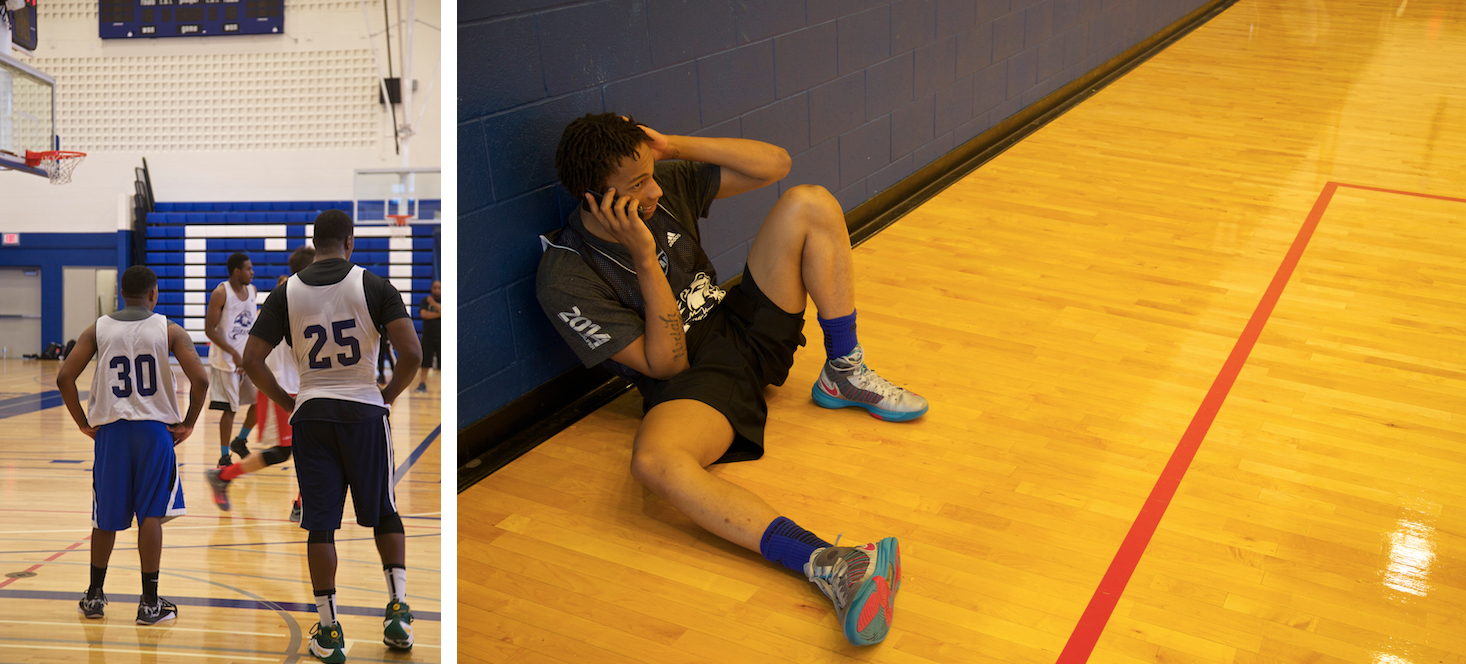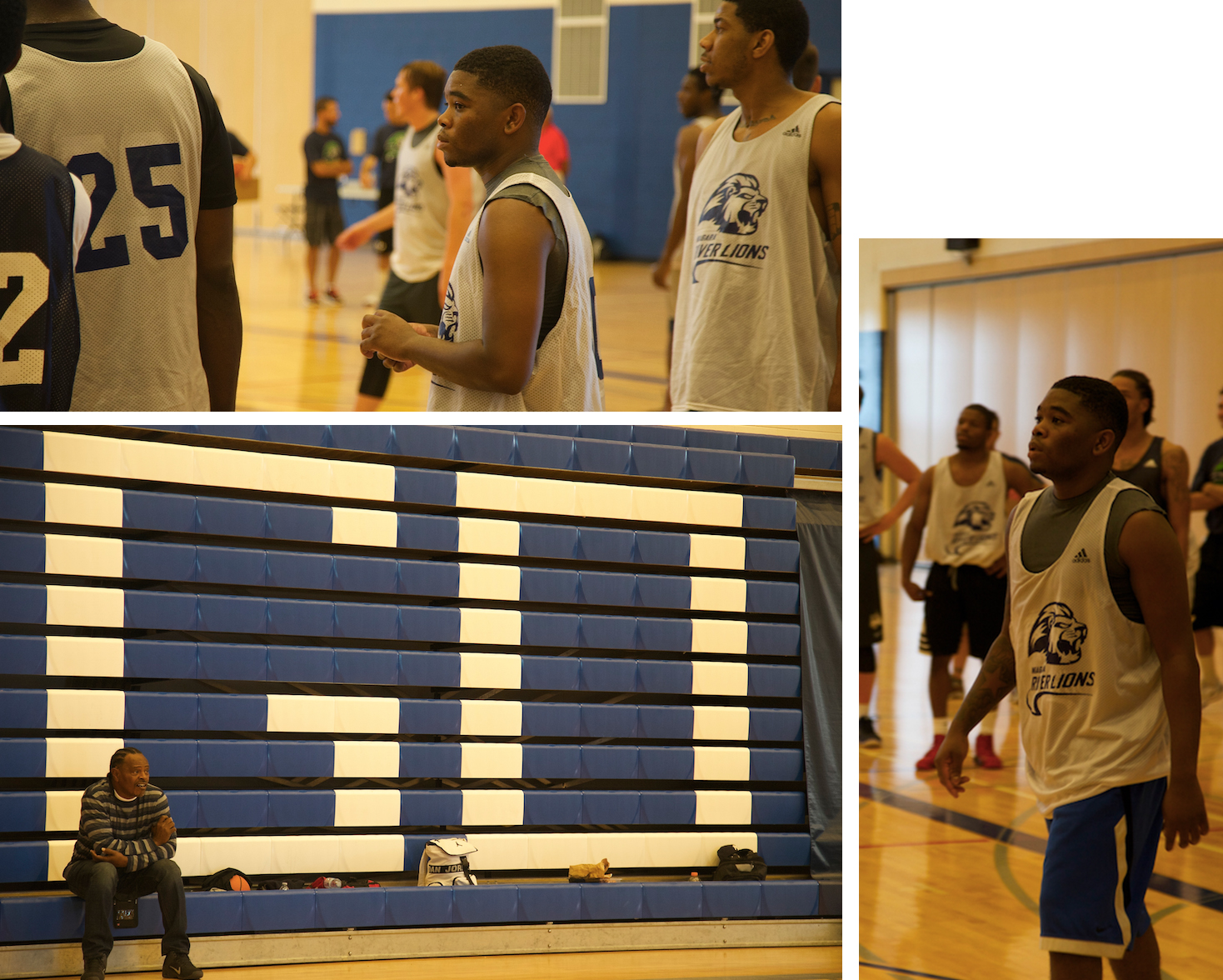When the buzzer erupts inside the gymnasium at Niagara College, 37 basketball players from across Ontario and into America—Illinois, Indiana, Maine, New York, Pennsylvania—stop shooting baskets and hustle into place in front of Ken Murray, who is about to deliver the day’s opening pep talk.
Murray, 62, tall and lean, with a full mop of graying hair and a well-cooked suntan, is one of Canada’s most storied collegiate coaches. He’s won two national titles, led nearby Brock University to the most wins in school history, and coached at nearly every level there is over a 31-year career. Now he’s the head coach and general manager of the Niagara River Lions, the newest franchise in Canada’s pro basketball league. The athletes are here, at an open tryout, to earn a spot on his roster.
Murray has been on this court before, but most of the players in front of him have not. They’ve come from Division I, II, and III schools, or Canadian colleges, or overseas leagues. Some had this tryout circled on their calendars months ago, others showed up this morning, paying $175 (Canadian) to get in the door. At least one took a bus from Atlanta. Another flew up from Florida with his father. One more is somewhere on the outskirts of Toronto, still stuck in traffic. They range in age, height, and skill, though almost all appear to be quite good at playing basketball. A few are very good. The goal, for Coach Murray, is to find one or two players today that will become the newest members of the newest team in a league that’s still learning how to grow.

“Now the first thing I did, when I saw your names, was look you up,” Murray says. He’s standing at center court, a navy blue River Lions polo is tucked into his khaki shorts. (The name River Lions comes from the Niagara Region’s coat of arms, which features the mythical creature in honor of the area’s indigenous peoples.) The players form a horseshoe around the coach; local media hovers at the edges. A handful of parents, girlfriends, and wives sit in the bleachers. “I was impressed with what I saw,” the coach continues, “but now I want to see what you can do here. The best way to get noticed is right here, today.”

When he wraps up his speech the players instinctively scatter into the far corners of the gym, forming layup lines under the baskets, the same drills they’ve been running since they were kids. Here, in this unfamiliar gym, in a room filled with strangers, everything snaps into place once the basketballs are rolled out.
Well, almost everything. Errant passes send balls wildly bounding across the court, players running with their heads down stumble into each other, others appear entirely unsure of where to go, or who to pass to, or what exactly they’re supposed to be doing. It’s mostly nerves though; after a few minutes, things start to work themselves out, the players start to find their rhythm.
The league is now in its fifth year, which makes it the longest tenured domestic pro basketball league in the country’s history, but growing a league from scratch requires, among other things, growing athletes. Everyone here, from the players to the coaches to the owners, is mostly new to this. They’re trying to learn together.
“We’re really looking for guys with good character, good attitudes; it’s really about how they handle themselves when things don’t go great,” says Jeff Sotiriou, the team’s director of operations. “For most of these guys it’s a lifelong dream to play professional basketball.”
The atmosphere in the gym is tense, a mix of stress and high energy, like the lobby of a job interview, if the applicants were forced into a push-up contest. It’s immediately clear, though, that most of these players aren’t here to waste anyone’s time.
One of the players hoping to stand out is 22-year-old Evonte’ Champion, who, in the last 24 hours, has traveled with his father from Fort Lauderdale to Charlotte to Buffalo to this gym, having registered at the door earlier this morning. “It’s always been my dream,” says the sinewy 5’10” guard of playing pro basketball. “Europe, Spain, Kansas, anywhere. I just want to show everybody what I can do.”
It’s an emotional day for Champion, who is a few years removed from a junior college career that was abruptly cut short when his grandmother passed. The shock of her death pushed him out of school, and away from the game. Two years have passed since, and this is his first competitive showing since college.
As he works through a set of shooting drills, Champion’s father, Everett, watches on from the corner of the gym. Originally from Louisiana, Everett was a six-time All-American athlete in indoor and outdoor track and field. “I try to put him in a position to succeed,” Everett says, his words coated with a syrupy Southern inflection. “In life it takes time, everything happens at a time, and maybe this is his time.”
Despite the relative youth of the NBL, a number of recognizable names have already played their way into and out of the eight-team league. Aquille Carr, Renardo Sidney, and Josiah Turner are some examples. Prospects who were each touted as the next big thing, surefire NBA draft picks, second comings of NBA greats like Steve Nash and Chris Webber. Those sorts of benchmarks are rarely ever fair or justified, and the players mentioned above haven’t been able to crack an NBA roster, but, in Canada, they found something else: a place to develop quietly, away from magnified hometown expectations, or sports pundits, or overeager fans. When playing in a league on the fringe of relevance the societal pressure to succeed is still high, but there’s also an understanding, and a reminder, that there’s life beyond basketball.
“What we’re trying to do is give some of these players that may not have been able to go to university an avenue to work with us, and we can give them an avenue to be successful,” says Josh Knoester, the team’s head of corporate partnerships and sales. “We’re there to help them through their personal issues when we can. These are real human beings and they’re just like everybody else. Sometimes things come up.”

Two hours have passed before Coach Murray hits the buzzer and gives the players a few minutes to rest. They congregate along the sidelines, heads down, hands on their hips, sweat hitting the floor. They’ve been running drills since they walked into the gym.

On the sidelines, they’re greeted by parents and partners and sons and daughters who run onto the court and muscle up their own shots that fight to make it to the rim. A few players step into the hallway to make calls on their cell phones, more than one leaves the gym, not to return.
“You guys are getting a little fatigued, and when fatigue sets in, the mind goes,” Murray says as he pulls everyone back onto the court. “This is going to be gut check time. This is when I really start paying attention, seeing who’s got it and who doesn’t.”
With about an hour left to go, the players are broken up into teams, and let loose for a full-court scrimmage. The coaches follow the action, relaying messages to each other with cupped hands over their mouths, clipboards at the ready. On the sideline, leaning up against the wall, Everett watches his son.
“I want to see him play professional ball if he can, if he can make it,” he says. “I just want to see him be successful just in life in general. You know, go ahead, get married, have some kids, be successful. It’s not all about being rich; it’s about being comfortable.”
The scrimmage is fast-paced, at times hectic, a bit out of control. There are referees running up and down with the players but they might as well not be there. Bodies, fighting for rebounds or reeling from hard screens, thud into the hard wood. Passes are lobbed high into the air, and screams ring out as the players soar to catch them.
“He’s growing up,” Everett says. “In life you gotta take some lumps, and he’s gonna get some lumps. If this is one of them then you just gotta take it. He’ll be all right either way.” Evonte’ dribbles up court, looking every part the point guard that the team is searching for, but it’s hard to tell. The team won’t have its roster worked out until December. By then, some of these players will have found other teams in other leagues, or other jobs in other places. Some will still be chasing this dream, others will have moved onto another.
On the court, Evonte’ calls his own number and hoists a long three-pointer in transition. The ball hangs in the air, and then falls well short of the rim, rolling out of bounds. Shortly after, he checks out of the game, and watches the final few minutes from the sidelines, hunched forward, a pleading look in his eyes. One shot won’t be the difference between making the team or not, but in this atmosphere, it’s easy to feel like it could be. When the buzzer sounds, Evonte’ straightens up and rushes to the other side of the gym. This game is over, but there’s still more left to play.
The Sports Lens is a running series exploring the intersection of sports and culture.

Lead Photo: At tryouts for the newest team in the Canadian basketball league. (Photo: Max Leighton)




